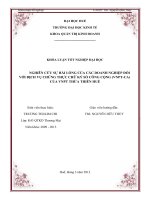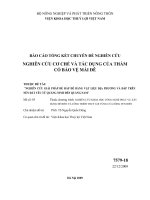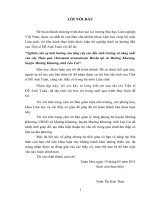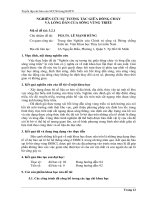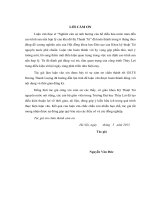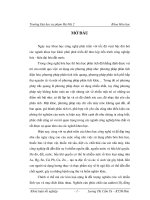Nghiên cứu sự tương tác của siêu vật liệu – metamaterials với trường điện từ trên cơ sở lý thuyết môi trường hiệu dụng
Bạn đang xem bản rút gọn của tài liệu. Xem và tải ngay bản đầy đủ của tài liệu tại đây (600.05 KB, 10 trang )
THÔNG TIN VỀ LUẬN VĂN THẠC SĨ
1. Họ và tên học viên: Bùi Sơn Tùng
2. Giới tính: Nam
3. Ngày sinh: 4/10/1988
4. Nơi sinh: Cần Thơ
5. Quyết định công nhận học viên số: 3619/QĐ-CTSV, ngày 30 tháng 12 năm 2010
6. Các thay đổi trong quá trình đào tạo: Không
7. Tên đề tài luận văn: Nghiên cứu sự tương tác của siêu vật liệu –
metamaterials với trường điện từ trên cơ sở lý thuyết môi trường hiệu dụng.
8. Chuyên ngành Vật lý chất rắn
9. Mã số: 60.44.07
10. Cán bộ hướng dẫn khoa học: TS. Vũ Đình Lãm, Viện Khoa học Vật liệu - Viện
Khoa học và Công nghệ Việt Nam.
11. Tóm tắt các kết quả của luận văn:
Ngoài phần mở đầu, kết luận, và tài liệu tham khảo, luận văn chia làm 3 chương:
Chương 1: Giới thiệu tổng quan về siêu vật liệu – metamaterials.
Chương 2: Miêu tả phương pháp nghiên cứu, bao gồm lựa chọn cấu trúc,
phương pháp mô phỏng và phương pháp tính toán các tham số điện từ hiệu
dụng.
Hình 1. Ô cơ sở của cấu trúc cặp dây bị cắt (CWP) và sự phân cực của sóng điện từ.
Chương 3: Trình bày các kết quả thu được và thảo luận. Kết quả chính của luận
văn bao gồm:
* Xây dựng thành công chương trình tính toán các tham số điện từ hiệu dụng.
* Mô phỏng thành công siêu vật liệu có độ từ thẩm âm sử dụng cấu trúc cặp dây
bị cắt (CWP):
(a)
(b)
Hình 2. (a) Phổ truyền qua và phản xạ của cấu trúc CWP.
(b) Sự phụ thuộc của độ từ thẩm theo tần số.
Phổ truyền qua cho thấy hiện tượng cộng hưởng từ xảy ra tại tần số 1.9 THz dẫn
đến 1 vùng không truyền qua xung quanh tần số này. Kết quả tính toán xác nhận
độ từ thẩm âm đạt được trong khoảng tần số từ 1.88 - 2.17 THz.
* Mở rộng dải tần của siêu vật liệu bằng mô hình lai hóa:
(a)
(b)
(c)
(d)
(e)
(f)
(g)
Hình 3. (a) Mô hình lai hóa bậc 2 cho 2 CWP. Phổ truyền qua, phản xạ và độ hấp thụ ứng với
khoảng cách d giữa 2 CWP bằng (b) 6ts, (c) 5ts, (d) 4ts, (e) 3ts, (f) 2ts, (g) ts.
Đề xuất mô hình lai hóa bậc 2 cho 2 CWP. Kết quả mô phỏng cho thấy tần số
cộng hưởng từ dần mở rộng và tách ra như mô hình lai hóa đã đề xuất. Vùng tần
số có độ từ thẩm âm được mở rộng ra với độ rộng tăng từ 0.14 THz lên thành
0.28 THz khi khoảng cách giữa 2 CWP giảm từ d = 3ts xuống d = ts.
Hình 4. Độ từ thẩm phụ thuộc vào khoảng cách d giữa 2 CWP.
* Siêu vật liệu có khả năng tùy biến được điều khiển bằng nhiệt độ:
Tích hợp bán dẫn InSb vào siêu vật liệu đóng vai trò như kim loại linh động. Khi
nhiệt độ tăng từ 300 đến 350K, nồng độ hạt tải và tần số plasma của InSb tăng
dần và tính chất kim loại của bán dẫn InSb càng tăng.
(a)
(b)
Hình 5. (a) Ô cơ sở của siêu vật liệu có cấu trúc đĩa tròn. (b) Sự phụ thuộc của nông độ hạt tải và
tần số plasma theo nhiệt độ.
Kết quả mô phỏng phổ truyền qua cho thấy đỉnh cộng hưởng từ đã dịch từ tần số 0.6
đến 0.85 THz khi nhiệt độ tăng từ 300 lên 350 K. Bên cạnh đó, cường độ của cộng
hưởng từ cũng có xu hướng tăng dần khi nhiệt độ tăng. Độ từ thẩm âm đã đạt được
trong vùng nhiệt độ khảo sát. Khi nhiệt độ tăng, vùng có độ từ thẩm âm trở nên rộng
hơn và dịch chuyển về phía tần số cao.
(a)
(b)
Hình 6. Sự phụ thuộc vào nhiệt độ của (a) Phổ truyền qua và (b) Độ từ thẩm, đường nét liền tương
ứng với giá trị có độ từ thẩm bằng 0.
12. Khả năng ứng dụng trong thực tiễn:
13. Những hướng nghiên cứu tiếp theo:
- Nghiên cứu mở rộng dải tần hoạt động của vật liệu chiết suất âm dựa trên mô
hình lai hóa bậc 2.
- Nghiên cứu công nghệ chế tạo và phương pháp khảo sát ở vùng tần số THz.
- Chế tạo và đo đạc tính chất của siêu vật liệu dải rộng và siêu vật liệu tùy biến
hoạt động ở vùng tần số THz.
- Nghiên cứu khả năng điều khiển tính chất của siêu vật liệu bằng các tác động
ngoại vi khác như quang, điện, ...
14. Các công trình đã công bố có liên quan đến luận văn:
1. Nguyen Thanh Tung, Do Thanh Viet, Bui Son Tung, Nguyen Van Hieu, Peter
Lievens, and Vu Dinh Lam, “Broadband Negative Permeability by Hybridized
Cut-Wire Pair Metamaterials”, Applied Physics Express 5 (11), 112001 (2012).
2. D. T. Viet, N. T. Tung, N. T. Hien, Y. P. Lee, B. S. Tung, and V. D. Lam,
“Multi-plasmon resonances supporting the negative refractive index in “singleatom” metamaterials”, Journal of Nonlinear Optical Physics & Materials 21 (2),
1250019 (2012).
3. Thanh Viet Do, Son Tung Bui, Van Quynh Le, Thi Hien Nguyen, Trong Tuan
Nguyen, Thanh Tung Nguyen, YoungPak Lee and Dinh Lam Vu, “Design,
fabrication and characterization of a perfect absorber using simple cut-wire
metamaterials”, Advances in Natural Sciences: Nanoscience and
Nanotechnology 3 (4), 045014 (2012).
4. Son Tung Bui, Xuan Khuyen Bui, Van Dung Nguyen, Thanh Tung Nguyen,
Vu Chung Hoang, Tadaaki Nagao, Young Pak Lee and Dinh Lam Vu, “Tuning
magnetic behavior of a dish pair structure metamaterial by temperature variation
in the THz region”, IWAMSN, Halong City, Vietnam, October 30 – November
2, 2012.
Ngày 10 tháng 12 năm 2012
Học viên
Bùi Sơn Tùng
INFORMATION ON MASTER’THESIS
1. Full name: Bui Son Tung
2. Sex: Male
3. Date of birth:
4. Place of birth: Can Tho
4/10/1988
5. Admission decision number: 3619/QĐ-CTSV Dated 30/12/2010
6. Changes in academic process: None
7. Official thesis title: Studying the interaction between metamaterials and the
electromagnetic field based on the effective medium theory.
8. Major: Solid state physics
9. Code: 60.44.07
10. Supervisors: Dr. Vu Dinh Lam, Institute of Materials Science, Vietnam
Academy of Science and Technology.
11. Summary of the finding of the thesis:
Beside the introduction, conclusion, and references, the thesis divided into three
parts:
Chapter 1: Introduction of metamaterials.
Chapter 2: Research Method includes choice of metamaterials structure,
simulation method and electromagnetic parameters retrieval method applying to
metamaterials.
Figure 1. A unit cell of cut-wire pair (CWP) structure and electromagnetic polarizaion.
Chapter 3: Results and discussion, which is divided in three parts:
* Successfully building code pack to calculate the electromagnetic parameters.
* Simulation results of negative permeability metamaterials using cut-wire pair
structure (CWP):
(a)
(b)
Figure 2. (a) Transmision and reflection spectra of CWP structure.
(b) Dependence of permeability on frequency.
Transmission result shows a magnetic resonance at 1.9 THz, that leads to a
band-gap around this frequency. The retrieval method confirms that the negative
permeability is achieved in a frequency range from 1.88 to 2.17 THz.
* Broadband metamaterials based on hybridization model:
(a)
(b)
(c)
(d)
(e)
(f)
(g)
Figure 3. (a) Second-order hybridization scheme of 2 CWPs. Transmission, reflection and
absorbance corresponding to distance d between 2 CWPs, which equals (b) 6ts, (c) 5ts, (d) 4ts,
(e) 3ts, (f) 2ts, (g) ts.
Second-order hybridization scheme is presented for 2 CWPs. Simulated
transmission exhibits broadening and splitting the magnetic resonance frequency
that is in well agreement to the second-order hybridization model. Negative
permeability band is extended with the increase of bandwidth, from 0.14 THz to
0.28 THz, corresponding to the decrease of distance between 2 CWPs, from d =
3ts to d = ts.
Figure 4. Influence of distance d on the permeability.
* Tunable metamaterials by thermal controlling:
Semiconductor InSb is incorporated into metamaterials and plays a role as
mutable metal. When the temperature increase from 300 to 350 K, the carrier
density and plasma frequency of InSb increase. The semiconductor InSb exhibits
more metallic feature.
(a)
(b)
Figure 5. (a) A unit cell of disk structure metamaterials. (b) Dependence of carrier density and
plasma frequency on temperature.
Simulated transmission spectrum shows a shift of magnetic resonance from 0.6 to
0.85 THz when the temperature increases from 300 to 350 K. In addition, the
resonance magnitude is strengthened too. The retrieval method confirms that the
negative permeability is achieved in the heating range. When the temperature is
raised, the negative permeability band is wider and shifts towards the higher
frequency.
(a)
(b)
Figure 6. Influence of temperature on (a) transmission and (b) permeability, the solid line indicates
coressponding to permeabilty of 0.
12. Practical applicability:
13. Further research directions:
- Studying the broadband negative index metamaterials based on the secondorder hybridization model.
- Studying fabrication and measurements technique at THz frequency.
- Fabricate broadband metamaterials and tunable metamaterials working at THz
frequency. Measure their properties and features at the THz frequency.
- Studying the manipulation of properties of metamaterial using other external
activities, such as optical and electrical impact, ...
14. Thesis-related publications:
1. Nguyen Thanh Tung, Do Thanh Viet, Bui Son Tung, Nguyen Van Hieu, Peter
Lievens, and Vu Dinh Lam, “Broadband Negative Permeability by Hybridized
Cut-Wire Pair Metamaterials”, Applied Physics Express 5 (11), 112001 (2012).
2. D. T. Viet, N. T. Tung, N. T. Hien, Y. P. Lee, B. S. Tung, and V. D. Lam,
“Multi-plasmon resonances supporting the negative refractive index in “singleatom” metamaterials”, Journal of Nonlinear Optical Physics & Materials 21 (2),
1250019 (2012).
3. Thanh Viet Do, Son Tung Bui, Van Quynh Le, Thi Hien Nguyen, Trong Tuan
Nguyen, Thanh Tung Nguyen, YoungPak Lee and Dinh Lam Vu, “Design,
fabrication and characterization of a perfect absorber using simple cut-wire
metamaterials”, Advances in Natural Sciences: Nanoscience and
Nanotechnology 3 (4), 045014 (2012).
4. Son Tung Bui, Xuan Khuyen Bui, Van Dung Nguyen, Thanh Tung Nguyen,
Vu Chung Hoang, Tadaaki Nagao, Young Pak Lee and Dinh Lam Vu, “Tuning
magnetic behavior of a dish pair structure metamaterial by temperature variation
in the THz region”, IWAMSN, Halong City, Vietnam, October 30 – November
2, 2012.
Date: 10/12/2012
Signature:
Full name: Bui Son Tung


